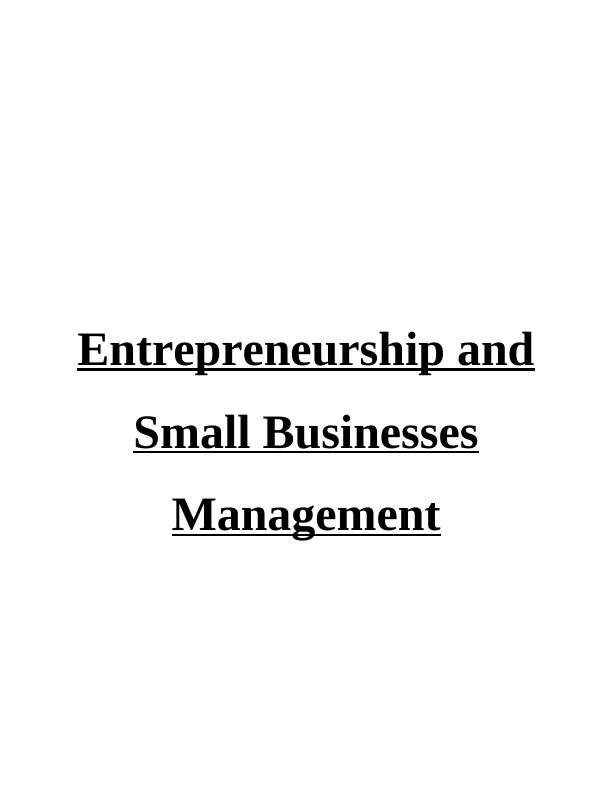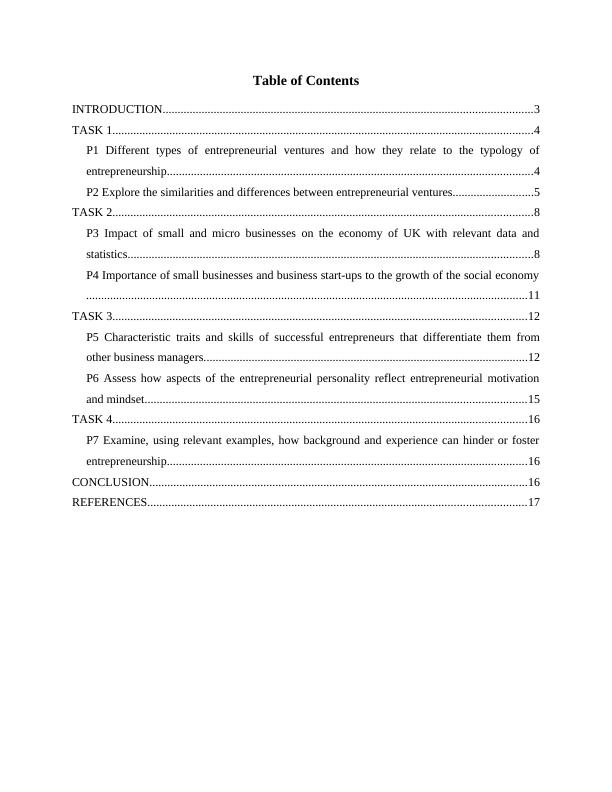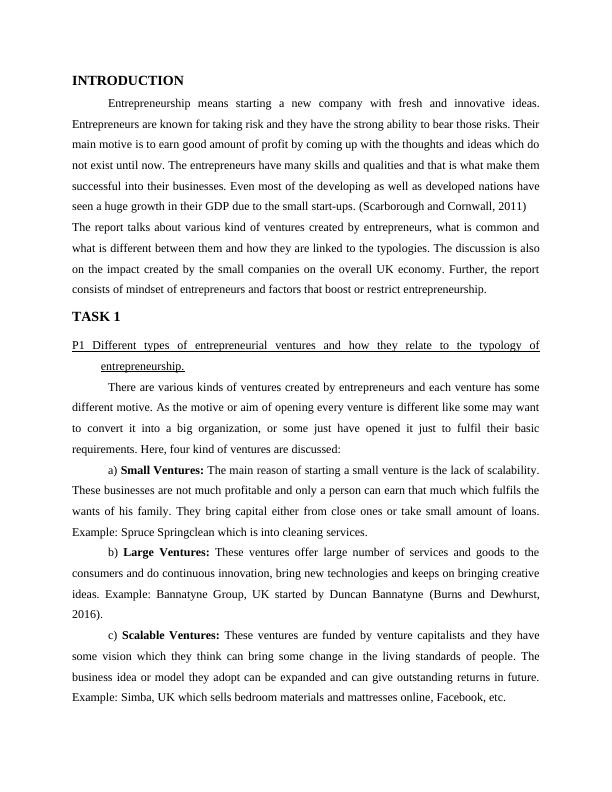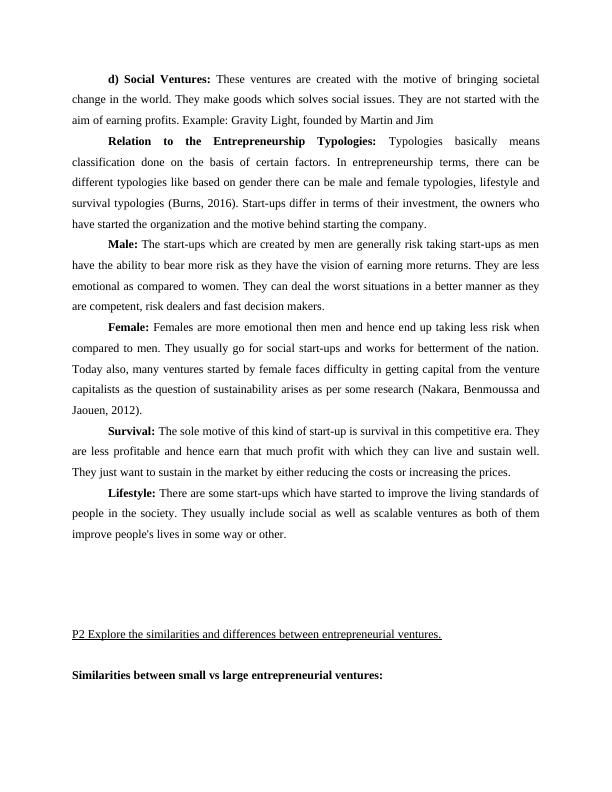Impact of Small and Micro Businesses on the Economy of UK
19 Pages4921 Words26 Views
Added on 2023-01-18
About This Document
This article discusses the impact of small and micro businesses on the economy of UK. It explores the contribution of these businesses in terms of employment, GDP, and turnover. Relevant data and statistics are provided to support the discussion.
Impact of Small and Micro Businesses on the Economy of UK
Added on 2023-01-18
ShareRelated Documents
Entrepreneurship and
Small Businesses
Management
Small Businesses
Management

Table of Contents
INTRODUCTION...........................................................................................................................3
TASK 1............................................................................................................................................4
P1 Different types of entrepreneurial ventures and how they relate to the typology of
entrepreneurship..........................................................................................................................4
P2 Explore the similarities and differences between entrepreneurial ventures...........................5
TASK 2............................................................................................................................................8
P3 Impact of small and micro businesses on the economy of UK with relevant data and
statistics.......................................................................................................................................8
P4 Importance of small businesses and business start-ups to the growth of the social economy
...................................................................................................................................................11
TASK 3..........................................................................................................................................12
P5 Characteristic traits and skills of successful entrepreneurs that differentiate them from
other business managers............................................................................................................12
P6 Assess how aspects of the entrepreneurial personality reflect entrepreneurial motivation
and mindset...............................................................................................................................15
TASK 4..........................................................................................................................................16
P7 Examine, using relevant examples, how background and experience can hinder or foster
entrepreneurship........................................................................................................................16
CONCLUSION..............................................................................................................................16
REFERENCES..............................................................................................................................17
INTRODUCTION...........................................................................................................................3
TASK 1............................................................................................................................................4
P1 Different types of entrepreneurial ventures and how they relate to the typology of
entrepreneurship..........................................................................................................................4
P2 Explore the similarities and differences between entrepreneurial ventures...........................5
TASK 2............................................................................................................................................8
P3 Impact of small and micro businesses on the economy of UK with relevant data and
statistics.......................................................................................................................................8
P4 Importance of small businesses and business start-ups to the growth of the social economy
...................................................................................................................................................11
TASK 3..........................................................................................................................................12
P5 Characteristic traits and skills of successful entrepreneurs that differentiate them from
other business managers............................................................................................................12
P6 Assess how aspects of the entrepreneurial personality reflect entrepreneurial motivation
and mindset...............................................................................................................................15
TASK 4..........................................................................................................................................16
P7 Examine, using relevant examples, how background and experience can hinder or foster
entrepreneurship........................................................................................................................16
CONCLUSION..............................................................................................................................16
REFERENCES..............................................................................................................................17

INTRODUCTION
Entrepreneurship means starting a new company with fresh and innovative ideas.
Entrepreneurs are known for taking risk and they have the strong ability to bear those risks. Their
main motive is to earn good amount of profit by coming up with the thoughts and ideas which do
not exist until now. The entrepreneurs have many skills and qualities and that is what make them
successful into their businesses. Even most of the developing as well as developed nations have
seen a huge growth in their GDP due to the small start-ups. (Scarborough and Cornwall, 2011)
The report talks about various kind of ventures created by entrepreneurs, what is common and
what is different between them and how they are linked to the typologies. The discussion is also
on the impact created by the small companies on the overall UK economy. Further, the report
consists of mindset of entrepreneurs and factors that boost or restrict entrepreneurship.
TASK 1
P1 Different types of entrepreneurial ventures and how they relate to the typology of
entrepreneurship.
There are various kinds of ventures created by entrepreneurs and each venture has some
different motive. As the motive or aim of opening every venture is different like some may want
to convert it into a big organization, or some just have opened it just to fulfil their basic
requirements. Here, four kind of ventures are discussed:
a) Small Ventures: The main reason of starting a small venture is the lack of scalability.
These businesses are not much profitable and only a person can earn that much which fulfils the
wants of his family. They bring capital either from close ones or take small amount of loans.
Example: Spruce Springclean which is into cleaning services.
b) Large Ventures: These ventures offer large number of services and goods to the
consumers and do continuous innovation, bring new technologies and keeps on bringing creative
ideas. Example: Bannatyne Group, UK started by Duncan Bannatyne (Burns and Dewhurst,
2016).
c) Scalable Ventures: These ventures are funded by venture capitalists and they have
some vision which they think can bring some change in the living standards of people. The
business idea or model they adopt can be expanded and can give outstanding returns in future.
Example: Simba, UK which sells bedroom materials and mattresses online, Facebook, etc.
Entrepreneurship means starting a new company with fresh and innovative ideas.
Entrepreneurs are known for taking risk and they have the strong ability to bear those risks. Their
main motive is to earn good amount of profit by coming up with the thoughts and ideas which do
not exist until now. The entrepreneurs have many skills and qualities and that is what make them
successful into their businesses. Even most of the developing as well as developed nations have
seen a huge growth in their GDP due to the small start-ups. (Scarborough and Cornwall, 2011)
The report talks about various kind of ventures created by entrepreneurs, what is common and
what is different between them and how they are linked to the typologies. The discussion is also
on the impact created by the small companies on the overall UK economy. Further, the report
consists of mindset of entrepreneurs and factors that boost or restrict entrepreneurship.
TASK 1
P1 Different types of entrepreneurial ventures and how they relate to the typology of
entrepreneurship.
There are various kinds of ventures created by entrepreneurs and each venture has some
different motive. As the motive or aim of opening every venture is different like some may want
to convert it into a big organization, or some just have opened it just to fulfil their basic
requirements. Here, four kind of ventures are discussed:
a) Small Ventures: The main reason of starting a small venture is the lack of scalability.
These businesses are not much profitable and only a person can earn that much which fulfils the
wants of his family. They bring capital either from close ones or take small amount of loans.
Example: Spruce Springclean which is into cleaning services.
b) Large Ventures: These ventures offer large number of services and goods to the
consumers and do continuous innovation, bring new technologies and keeps on bringing creative
ideas. Example: Bannatyne Group, UK started by Duncan Bannatyne (Burns and Dewhurst,
2016).
c) Scalable Ventures: These ventures are funded by venture capitalists and they have
some vision which they think can bring some change in the living standards of people. The
business idea or model they adopt can be expanded and can give outstanding returns in future.
Example: Simba, UK which sells bedroom materials and mattresses online, Facebook, etc.

d) Social Ventures: These ventures are created with the motive of bringing societal
change in the world. They make goods which solves social issues. They are not started with the
aim of earning profits. Example: Gravity Light, founded by Martin and Jim
Relation to the Entrepreneurship Typologies: Typologies basically means
classification done on the basis of certain factors. In entrepreneurship terms, there can be
different typologies like based on gender there can be male and female typologies, lifestyle and
survival typologies (Burns, 2016). Start-ups differ in terms of their investment, the owners who
have started the organization and the motive behind starting the company.
Male: The start-ups which are created by men are generally risk taking start-ups as men
have the ability to bear more risk as they have the vision of earning more returns. They are less
emotional as compared to women. They can deal the worst situations in a better manner as they
are competent, risk dealers and fast decision makers.
Female: Females are more emotional then men and hence end up taking less risk when
compared to men. They usually go for social start-ups and works for betterment of the nation.
Today also, many ventures started by female faces difficulty in getting capital from the venture
capitalists as the question of sustainability arises as per some research (Nakara, Benmoussa and
Jaouen, 2012).
Survival: The sole motive of this kind of start-up is survival in this competitive era. They
are less profitable and hence earn that much profit with which they can live and sustain well.
They just want to sustain in the market by either reducing the costs or increasing the prices.
Lifestyle: There are some start-ups which have started to improve the living standards of
people in the society. They usually include social as well as scalable ventures as both of them
improve people's lives in some way or other.
P2 Explore the similarities and differences between entrepreneurial ventures.
Similarities between small vs large entrepreneurial ventures:
change in the world. They make goods which solves social issues. They are not started with the
aim of earning profits. Example: Gravity Light, founded by Martin and Jim
Relation to the Entrepreneurship Typologies: Typologies basically means
classification done on the basis of certain factors. In entrepreneurship terms, there can be
different typologies like based on gender there can be male and female typologies, lifestyle and
survival typologies (Burns, 2016). Start-ups differ in terms of their investment, the owners who
have started the organization and the motive behind starting the company.
Male: The start-ups which are created by men are generally risk taking start-ups as men
have the ability to bear more risk as they have the vision of earning more returns. They are less
emotional as compared to women. They can deal the worst situations in a better manner as they
are competent, risk dealers and fast decision makers.
Female: Females are more emotional then men and hence end up taking less risk when
compared to men. They usually go for social start-ups and works for betterment of the nation.
Today also, many ventures started by female faces difficulty in getting capital from the venture
capitalists as the question of sustainability arises as per some research (Nakara, Benmoussa and
Jaouen, 2012).
Survival: The sole motive of this kind of start-up is survival in this competitive era. They
are less profitable and hence earn that much profit with which they can live and sustain well.
They just want to sustain in the market by either reducing the costs or increasing the prices.
Lifestyle: There are some start-ups which have started to improve the living standards of
people in the society. They usually include social as well as scalable ventures as both of them
improve people's lives in some way or other.
P2 Explore the similarities and differences between entrepreneurial ventures.
Similarities between small vs large entrepreneurial ventures:

End of preview
Want to access all the pages? Upload your documents or become a member.
Related Documents
Entrepreneurship and Small Business Managementlg...
|12
|3050
|339
Impact of Small and Micro Businesses on Economylg...
|17
|5159
|43
The Impact of Micro and Small Business on the Economylg...
|17
|5294
|373
Report on Impact of Micro and Small-business on UK economylg...
|21
|6076
|25
Entrepreneurship And Small Business Management in UKlg...
|15
|4448
|263
Assignment | Entrepreneurship And Small Business Management (PDF)lg...
|12
|3945
|471
